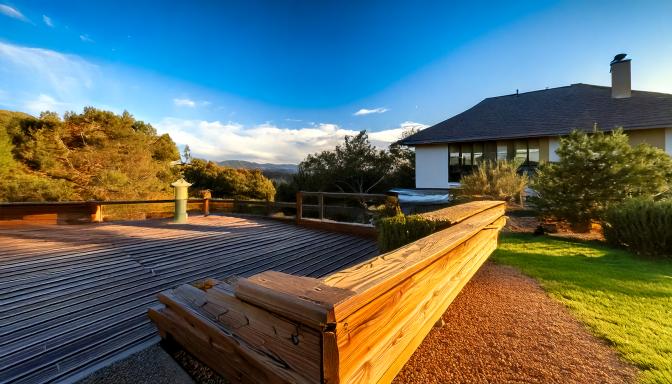Deck Inspections in California

Table of Contents
Decks are a vital part of residential and commercial properties, providing outdoor space for relaxation and entertainment. However, as with balconies, decks are subject to environmental wear and tear, which can compromise their structural integrity over time. To ensure safety and compliance with California’s stringent building laws, regular deck inspections are not just recommended—they’re essential. In this blog, we’ll explore the key aspects of deck inspections, with a focus on SB 326 and SB 721 laws, and how property owners can protect their assets and tenants.
What Are the Key Requirements for Deck Inspections in California?
California’s SB326 and SB721 laws were enacted to address safety concerns for exterior elevated elements, including decks and balconies, especially in multi-family properties. Under SB 326, all multifamily residential buildings with three or more units are required to have their exterior elevated elements—including decks—inspected every six years. SB 721 mandates similar inspections but applies to apartment buildings and complexes.
Both laws aim to prevent tragedies like deck or balcony collapses by mandating regular inspections conducted by licensed professionals. These inspections must be thorough, focusing on any signs of structural damage, deterioration, or hazards that could compromise the safety of the deck.
Contact DrBalcony for a professional inspection!
Ensure the safety of your balcony and living space with DrBalcony - We're a Tech Engineering firm that specializes in California SB326 & SB721 balcony inspections. Over 300+ completed projects in California.
Request A Free EstimateClick To CallWhy Are Deck Inspections Crucial for Property Safety?
Decks are continuously exposed to weather, which can cause materials to weaken over time. Regular inspections are crucial for detecting early signs of rot, water damage, or structural fatigue. A neglected deck can become a significant liability for property owners, especially if it poses a danger to tenants or visitors. Inspections help identify potential risks and provide an opportunity for timely repairs, thus preventing accidents and ensuring compliance with safety regulations.
In addition to safety, deck inspections also contribute to property value. Well-maintained decks not only provide a secure outdoor space but also enhance the aesthetic and functional value of the property.
How Does the SB 326 and SB 721 Inspection Process Work?
What happens during a deck inspection under California’s balcony and deck laws? Licensed professionals begin with a visual inspection, looking for signs of damage such as wood rot, rusting metal components, loose connections, and water intrusion. More advanced techniques, such as moisture meters or thermal imaging, may be used to detect hidden structural issues that aren’t visible on the surface.
Once the inspection is complete, the licensed inspector generates a detailed report outlining the condition of the deck, any safety concerns, and recommended repairs. Property owners are required to submit these reports to their local building department as part of the compliance process.

What Are the Costs Involved in Deck Inspections?
The cost of a deck inspection in California can vary depending on several factors, including the size and complexity of the deck, its age, and the materials used in its construction. While prices can range from a few hundred to several thousand dollars, the expense of an inspection pales in comparison to the potential costs of neglect—both in terms of liability and repair. Additionally, performing regular inspections and maintenance helps avoid more costly repairs down the line and can even prevent legal liabilities in the case of an accident.
How Can Property Owners Stay Compliant with Deck Inspection Laws?
Staying compliant with California’s balcony and deck inspection laws requires vigilance. Property owners should establish a timeline for regular inspections and choose licensed professionals familiar with SB 326 and SB 721 requirements. Additionally, keeping detailed records of all inspections and repairs is essential for compliance, as local building departments may require these documents during property assessments.
It’s also crucial for property owners to communicate with tenants about safety concerns. Informing residents about upcoming inspections and explaining the importance of deck maintenance can help foster a collaborative effort in maintaining property safety.
What Should You Look for When Hiring a Deck Inspector?
When hiring a deck inspector, it’s essential to verify their qualifications. Ensure that they are licensed to conduct inspections under SB 326 and SB 721 regulations, and ask for references or testimonials from previous clients. An experienced inspector should be familiar with California’s unique environmental conditions, such as coastal humidity or extreme temperatures, which can affect deck materials.
Additionally, inquire about the inspection process. A thorough inspection should involve more than just a visual check. Advanced techniques, such as the use of moisture meters or structural testing, can provide a more comprehensive understanding of the deck’s condition.
Contact DrBalcony for a professional inspection!
Ensure the safety of your balcony and living space with DrBalcony - We're a Tech Engineering firm that specializes in California SB326 & SB721 balcony inspections. Over 300+ completed projects in California.
Request A Free EstimateClick To CallConclusion: Protecting Your Property with Routine Deck Inspections
In California, deck inspections are not just a legal obligation but a necessary step to ensure the safety of tenants and visitors. By complying with SB 326 and SB 721 inspection requirements, property owners can prevent accidents, extend the lifespan of their decks, and avoid costly repairs. If you’re a property owner in California, now is the time to prioritize deck safety and schedule regular inspections with licensed professionals.
Stay informed, stay compliant, and protect your property from avoidable risks with professional deck inspections.
FAQ Section: Top Questions & Answers
My property is well-maintained. Do I really need SB-326/SB-721 inspections?
YES! Even with excellent maintenance, hidden issues can develop due to construction errors, material flaws, or severe weather exposure. Inspections are about ensuring those don’t turn into major problems.
Our balconies were inspected a few years ago – isn't that enough?
Unfortunately, no. California laws mandate inspections on a set schedule, often every 6 years. Deterioration can happen quickly, making regular assessments essential.
Can I use my regular handyman for the balcony inspection?
It’s not recommended. Unless they hold specific licenses (architect, structural engineer, etc.) their inspection won’t be considered valid for SB-326/SB-721 compliance.
What if the inspection uncovers major issues?
First, don’t panic! Early detection often means less extensive (and expensive) repairs are needed. Work with your inspector to prioritize fixes, and explore if they offer repair services for a streamlined solution.
I'm worried about the cost of inspections. Are there any resources to help?
Start by getting detailed quotes from multiple companies. Factor in that proactive inspections help you avoid even bigger costs down the line due to neglected problems. Some property management associations offer guidance on budgeting for balcony compliance.
